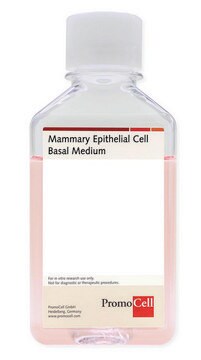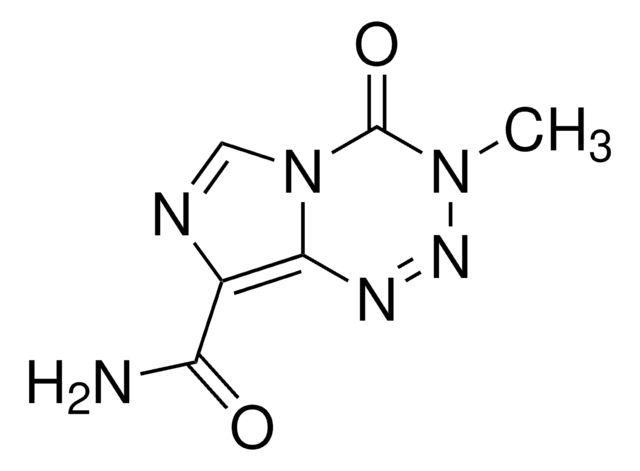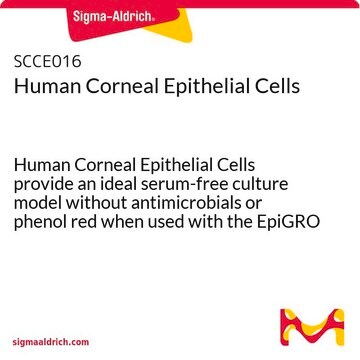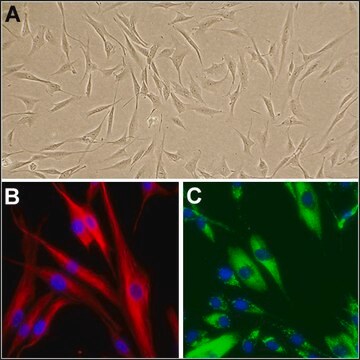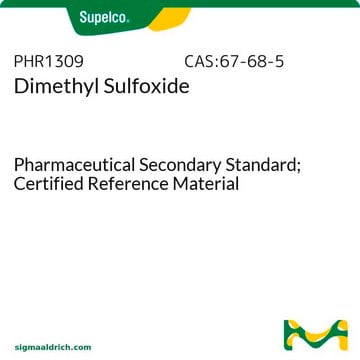830-05A
Human Mammary Epithelial Cells: HMEpC, adult
Synonym(s):
HMEpc cells
About This Item
Recommended Products
biological source
human mammary glands (normal)
Quality Level
packaging
pkg of 500,000 cells
manufacturer/tradename
Cell Applications, Inc
growth mode
Adherent
karyotype
2n = 46
morphology
epithelial
technique(s)
cell culture | mammalian: suitable
relevant disease(s)
cancer
shipped in
liquid nitrogen
storage temp.
−196°C
General description
Mammary Epithelial Cells provide an excellent model system to study many aspects of epithelial function and disease, particularly those related to cancerogenesis.
HMEpC have been utilized in numerous research publications, for example to:
- Investigate the role of exosomes secreted by cancer cells in formation of tumor permissive microenvironment through manipulation of normal mammary epithelium (Dutta, 2014)
- Serve as control in a study investigating antitumor properties of cannabinoids (Ligresti, 2006) and stem cell microenvironment (Rostovit, 2008)
- Determine that differential expression of glycoproteins allows to classify human breast cells into normal, benign, malignant, basal, and luminal groups (Yen, 2011, 2013; Timpe, 2013)
- Identify ALDH isoform 5A1 as a potential target for treatment of human breast ductal carcinoma (Kaur, 2012); and determine that combination of an anti-EGFR anti-VEGFR treatment using ZD6474 with phototherapy (UV-B) is more effective in treating breast cancer than either treatment alone (Sarkar, 2013)
- Demonstrate that although SIRT deacetylates p53, it does not play a role in cell survival following DNA damage (Solomon, 2006)
- Demonstrate the important roles of tumor suppressor Maspin by showing that it promotes mammary epithelial differentiation via its interaction with IRF6 (Bailey, 2008); mediates effects of IFN-γ on vacuolar pH, cathepsin D processing and autophagy, protects extracellular matrix (ECM) from degradation in normal mammary epithelia, and that Maspin loss in metastatic cancer leads to unrestricted ECM degradation, contributing to metastasis (Khalkhali-Ellis, 2007, 2008); and show that loss of EcSOD expression also promotes invasiveness by disrupting ECM (Teoh-Fitzgerald, 2012, 2013)
- Investigate the role of shortened telomeres in initiation of genomic instability, cytokinesis failure and polyploidy (Tusell, 2008; Soler, 2009; Pampalona, 2012); and elucidate the role of Myc in malignancy by studying its ability to transform primary epithelial cells (Thibodeaux, 2009)
- Demonstrate, along with Human dermal Fibroblasts, that resveratrol inhibits mono-ubiquitination of histone H2B (Gao, 2011)
HMEpC, along with Human Prostate Epithelial Cells, have also been used in a study demonstrating that TGF-b1 induces Smad 1/5/8 and Smad 2/3 phosphorylation and BMP signaling results only in Smad 1/5/8 phosphorylation in these primary epithelial cells, while in cancer cells BMP also elicits Smad2/3 activation, contributing to cancerogenesis (Holtzhausen, 2013).
Characterization: the cells have a characteristic morphology consistent with an epithelial origin and are positive for epithelial cell marker cytokeratin 18.
Cell Line Origin
Application
Components
Preparation Note
- 5th passage, >500,000 cells in Cell Basal Medium containing 10% FBS & 10% DMSO
- Can be cultured at least 16 doublings
Subculture Routine
Disclaimer
Storage Class
11 - Combustible Solids
wgk_germany
WGK 3
flash_point_f
Not applicable
flash_point_c
Not applicable
Certificates of Analysis (COA)
Search for Certificates of Analysis (COA) by entering the products Lot/Batch Number. Lot and Batch Numbers can be found on a product’s label following the words ‘Lot’ or ‘Batch’.
Already Own This Product?
Find documentation for the products that you have recently purchased in the Document Library.
Customers Also Viewed
Protocols
Mammary Epithelial Cells and primary epithelial cells from other tissue at Cell Applications, your worldwide provider of human & animal cells, antibodies.
Our team of scientists has experience in all areas of research including Life Science, Material Science, Chemical Synthesis, Chromatography, Analytical and many others.
Contact Technical Service


